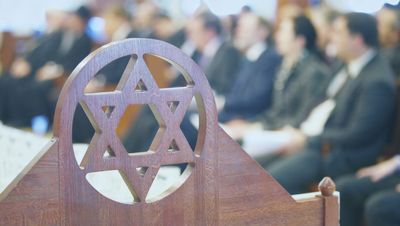[Editor's Note: This essay is in response to our current Big Question series: "How can the religious and scientific communities work together to foster a culture that is equipped to face humanity's biggest challenges?"]
I humbly submit that the question should be rephrased: How can the religious and scientific communities NOT work together to face humanity's biggest challenges? The stakes are higher than ever before, and we simply cannot afford to go it alone.
I believe in evolution -- the evolution of the relationship of science and religion.
The future of the world depends on our collaboration. I believe in evolution -- the evolution of the relationship of science and religion. Science and religion have lived in alternately varying relationships ranging from peaceful coexistence to outright warfare. Today we have evolved and have begun to embrace the biological relationship of mutualism. This is in part due to the advances in medicine and science.
Previous scientific discoveries and paradigm shifts precipitated varying theological responses. With Copernicus, we grappled with the relationship of the earth to the universe. With Darwin, we re-evaluated the relationship of man to the other creatures on earth. However, as theologically complex as these debates were, they had no practical relevance to the common man. Indeed, it was possible for people to live their entire lives happily without pondering these issues.
In the 21st century, the microscope is honing in further, with discoveries relating to the understanding of the very nature and composition of the human being, both body and mind/soul. Thus, as opposed to the past, the implications of the latest scientific advances directly affect the common man. The religious implications are not left to the ivory tower theologians. Regular people are now confronted with practical religious questions previously unimagined.
For example, in the field of infertility, if a married woman undergoes donor insemination, is she considered an adulteress? If a woman of one faith gestates the child of another faith, to whose faith does the child belong? If your heart is failing, can you avail yourself of stem cells derived from human embryos, or would you be considered an accomplice to murder? Would it be preferable to use artificially derived stem cells if they are available?
The implications of our current debates are profound, and profoundly personal. Science is the great equalizer. Every living being can potentially benefit from medical advances. We are all consumers of the scientific advances, irrespective of race or religion. As such, we all deserve a say in their development.
If the development of the science is collaborative, surely the contemplation of its ethical/religious applications should likewise be.
With gene editing, uterus transplants, head transplants, artificial reproductive seed, and animal-human genetic combinations as daily headlines, we have myriad ethical dilemmas to ponder. What limits should we set for the uses of different technologies? How should they be financed? We must even confront the very definition of what it means to be human. A human could receive multiple artificial transplants, 3D printed organs, genetic derivatives, or organs grown in animals. When does a person become another person or lose his identity? Will a being produced entirely from synthetic DNA be human?
In the Middle Ages, it was possible for one person to master all of the known science, and even sometimes religion as well, such as the great Maimonides. In the pre-modern era, discoveries were almost always attributed to one individual: Jenner, Lister, Koch, Pasteur, and so on. Today, it is impossible for any one human being to master medicine, let alone ethics, religion, etc. Advances are made not usually by one person but by collaboration, often involving hundreds, if not thousands of people across the globe. We cite journal articles, not individuals. Furthermore, the magnitude and speed of development is staggering. Add artificial intelligence and it will continue to expand exponentially.
If the development of the science is collaborative, surely the contemplation of its ethical/religious applications should likewise be. The issues are so profound that we need all genes on deck. The religious community should have a prominent seat at the table. There is great wisdom in the religious traditions that can inform contemporary discussions. In addition, the religious communities are significant consumers of, not to mention contributors to, the medical technology.
An ongoing dialogue between the scientific and religious communities should be an institutionalized endeavor, not a sporadic event, reactive to a particular discovery. The National Institutes of Health or other national organizations could provide an online newsletter designed for the clergy with a summary of the latest developments and their potential applications. An annual meeting of scientists and religious leaders could provide a forum for the scientists to appreciate the religious ramifications of their research (which may be none as well) and for the clergy to appreciate the rapidly developing fields of science and the implications for their congregants. Theological seminaries must include basic scientific literacy as part of their curricula.
We need the proper medium of mutual respect and admiration, despite healthy disagreement.
How do we create a "culture"? Microbiological cultures take time and require the proper medium for maximal growth. If one of the variables is altered, the culture can be affected. To foster a culture of continued successful collaboration between scientists and religious communities, we likewise need the proper medium of mutual respect and admiration, despite healthy disagreement.
The only way we can navigate these unchartered waters is through constant, deep and meaningful collaboration every single step of the way. By cultivating a mutualistic relationship we can inform, caution and safeguard each other to maximize the benefits of emerging technologies.
[Ed. Note: Don't miss the other perspectives in this Big Question series, from a science scholar and a Reverend/molecular geneticist.]
